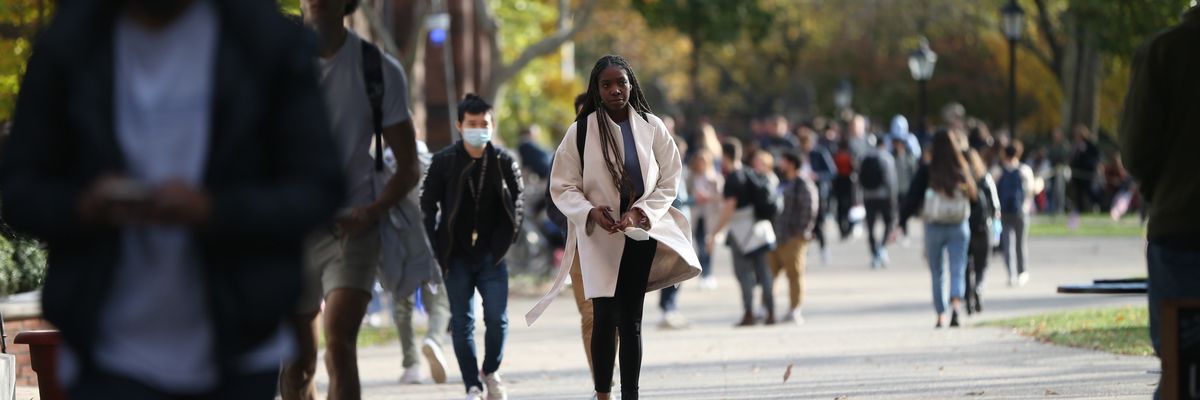We are students at the nine universities most recently targeted by President Donald Trump. We've spent years demanding that our universities improve conditions for students, lower tuition, and create spaces for the free exchange of ideas. No one told us the way to influence our universities was simply to bribe them with millions of dollars of federal funding.
On October 1, the Trump administration sent our schools a 10-point memo titled "Compact for excellence in higher education." If adopted, the compact would limit international student enrollment, force universities to share student information with the federal government, enforce the adoption of a specific definition of gender and threaten affinity spaces, and take action against actors that “punish, belittle, and even spark violence against conservative ideas.” In return, our universities are promised increased access to federal funding opportunities. If they don't comply? Well, any school can “elect to forgo federal benefits.”
This compact goes against every democratic principle our country and our schools should uphold, and we reject the Trump administration’s attempt to cajole universities into compliance through explicit bribery. It should go without saying that extorting universities to comply with ideological demands and quell freedom of speech is antidemocratic, but here we are.
In a public statement, White House Official May Mailman claimed that our nine universities—Brown, the University of Texas at Austin, the University of Arizona, Dartmouth, MIT, the University of Pennsylvania, Vanderbilt, the University of Virginia, and the University of Southern California—were chosen because they are "good actors." In other words, the Trump administration expects our universities to fold. And they expect to use our compliance as a green light to force universities across the country into similar agreements.
If any one of our universities agrees to this compact, it risks creating a chain reaction for the higher education system at-large to side with tyrants over students.
Here's the thing—we cannot deny that Trump's compact pointed out some very real issues in our higher education system. It is true that "too many young adults have become saddled with life-altering debt." It is true that "truth-seeking is a core function of institutions of higher education." For decades, young people have borne the brunt of our country's refusal to invest in education. As federal funding has fallen, administrator salaries have ballooned while faculty, staff, and graduate worker wages have stagnated and tuition prices have skyrocketed. Today, many of our schools are run more like hedge funds than like centers of learning. That's why we have continuously demanded that our government and our universities make higher education more accessible, and allow us to freely share our viewpoints on campus.
Trump's memo, however, does not actually sincerely seek to confront these issues. It is a thinly-veiled attempt to undermine fundamental principles of university independence and attack vulnerable students, and it is a clear instance of authoritarian overreach. Trump claims to value "truth-seeking," yet limits what "truth" can be sought. The compact places surveillance on what ideas can and cannot be present in the campus setting, requiring screening of international students for "anti-American" values. Under the guise of promoting campus discourse, it gives institutions the tools to gut departments that the Trump administration could frame as "belittling" conservative ideas. What counts as an "anti-American" value or "belittling" conservative ideas is malleable to the Trump administration's vantage point. The compact also effectively bans peaceful campus protest, a crucial part of civil discourse on our campuses.
To define a "free marketplace of ideas" by its adherence to a specific set of ideas and exclusion of a specific set of individuals is not creating a free marketplace at all: It's breeding authoritarianism.
This compact also asks our universities to commit to repression of LGBTQ+ students, including "biological" definitions of sex and gender, that would strip our queer students of protections and resources crucial to their right to a free and safe education. For LGBTQ+ students, this compact is not just a "political" attack; it is an immediate threat to our education and survival.
And this comes after a speech-chilling effect has already taken over our campuses. Students who dared to speak out in support of Palestine, especially, have faced extreme repression on campus, including police sweeps, expulsions, and attempted deportations. Over the summer, we watched as Brown University and the University of Pennsylvania signed agreements that sold students' personal information to the Department of Justice, excluded trans students from university life, and stripped them of their healthcare. We watched as the University of Virginia acquiesced to the Department of Justice's demands to dissolve diversity, equity, and inclusion offices against the wishes of the university community and forced President Jim Ryan to step down. We've watched our peers, Mahmoud Khalil and Rumeysa Öztürk, taken for daring to speak against Israel's genocide, and we continue to watch as Immigraton and Customs Enforcement takes our community members on and near our campuses.
The founding principles of our universities—quality education free from censorship, workforce development, and shared governance of university structures—have been under attack for decades. The solution is not to take a bribe from a wannabe-dictator who wants to trojan-horse exclusionary policies under the guise of protecting American students. The solution is to listen to the students, faculty, and staff who actually make our schools run.
This memo was sent out during a government shutdown. While key government programs are stopped and unknown numbers of federal employees are furloughed, the Trump administration is seeking ways to expand its power. If any one of our universities agrees to this compact, it risks creating a chain reaction for the higher education system at-large to side with tyrants over students. We demand that our universities do not fold, and do not sign.




